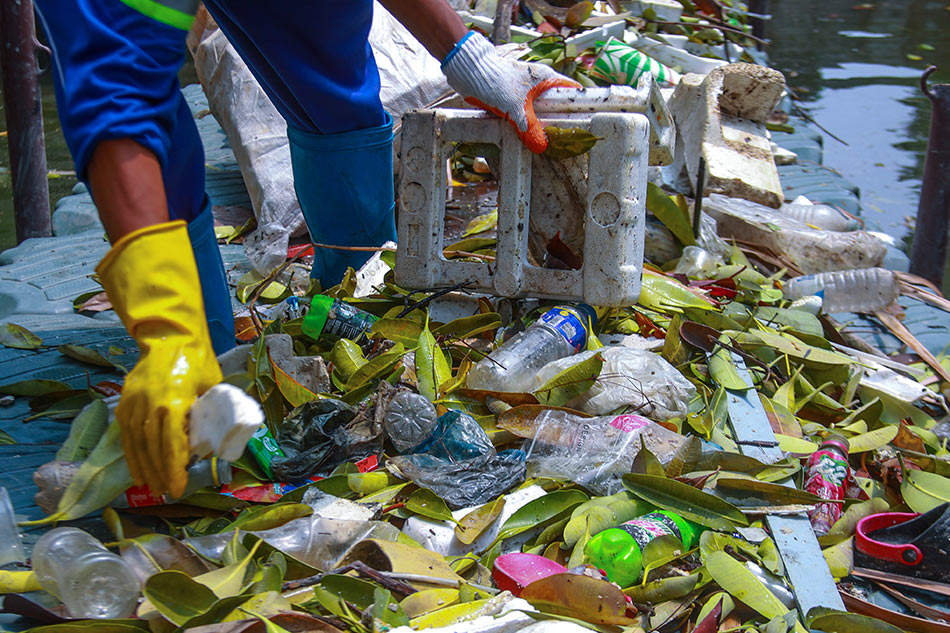PH 'losing war' vs single-use plastics, DENR chief says | ABS-CBN

Welcome, Kapamilya! We use cookies to improve your browsing experience. Continuing to use this site means you agree to our use of cookies. Tell me more!
PH 'losing war' vs single-use plastics, DENR chief says
PH 'losing war' vs single-use plastics, DENR chief says
Raphael Bosano,
ABS-CBN News
Published Jun 06, 2023 07:22 PM PHT
|
Updated Jun 06, 2023 08:03 PM PHT
MANILA – The Philippines is not winning the war against single-use plastic as the country continues to generate thousands of tons of plastic daily, environment and natural resources chief Toni Yulo-Loyzaga said Tuesday.
MANILA – The Philippines is not winning the war against single-use plastic as the country continues to generate thousands of tons of plastic daily, environment and natural resources chief Toni Yulo-Loyzaga said Tuesday.
DENR data based on World Bank and Asian Development Bank studies showed that the country generates around 61,000 metric tons of garbage per day.
DENR data based on World Bank and Asian Development Bank studies showed that the country generates around 61,000 metric tons of garbage per day.
Of this amount, 12 percent or over 7,000 tons is plastic. This is a stark contrast to the 16,000 metric tons of trash generated 7 years ago.
Of this amount, 12 percent or over 7,000 tons is plastic. This is a stark contrast to the 16,000 metric tons of trash generated 7 years ago.
Yulo-Loyzaga admitted that the problem of plastic is multifaceted and must be faced using different lenses.
Yulo-Loyzaga admitted that the problem of plastic is multifaceted and must be faced using different lenses.
ADVERTISEMENT
“It has a social issue attachment. If we cannot address the social issue, we will not be able to address the use of single-use plastics, specifically for certain sectors of our economy. Single use plastics is the only recourse for their use on a daily basis when they purchase their daily food or for other uses,” she said.
“It has a social issue attachment. If we cannot address the social issue, we will not be able to address the use of single-use plastics, specifically for certain sectors of our economy. Single use plastics is the only recourse for their use on a daily basis when they purchase their daily food or for other uses,” she said.
Single-use plastic is most commonly used in public markets and small stores where each purchase is usually wrapped or placed in clear plastic bags only to be discarded, at times inappropriately, just minutes after.
Single-use plastic is most commonly used in public markets and small stores where each purchase is usually wrapped or placed in clear plastic bags only to be discarded, at times inappropriately, just minutes after.
She noted that finding an alternative to single-use plastic is not as easy as it seems. Investing in chemistry and research to find the right alternative is, by itself, already a challenge.
She noted that finding an alternative to single-use plastic is not as easy as it seems. Investing in chemistry and research to find the right alternative is, by itself, already a challenge.
“The challenge is on academe. Of course government, we need to do our own research as well. But certainly the producers, those that are using plastic products, they need to be responsible for finding a sustainable replacement.”
“The challenge is on academe. Of course government, we need to do our own research as well. But certainly the producers, those that are using plastic products, they need to be responsible for finding a sustainable replacement.”
The problems caused by improper waste disposal is not something new. Every year, flooding has been linked to sewers and drainage systems clogged with various types of waste, particularly plastic. While there are efforts to integrate plastic in certain products like cement, Yulo-Loyzaga said nothing beats a simple yet difficult solution.
The problems caused by improper waste disposal is not something new. Every year, flooding has been linked to sewers and drainage systems clogged with various types of waste, particularly plastic. While there are efforts to integrate plastic in certain products like cement, Yulo-Loyzaga said nothing beats a simple yet difficult solution.
ADVERTISEMENT
“The real solution is to stop our over consumption of products that use packaging that doesn’t degrade. Again, that brings us back to 'ano ba yung substitute?'”
“The real solution is to stop our over consumption of products that use packaging that doesn’t degrade. Again, that brings us back to 'ano ba yung substitute?'”
To limit the use of single-use plastic packaging, the DENR is calling on enterprises to comply with the recently passed Extended Producer Responsibility Act. Under this, manufacturers are obliged to recover the plastic they generate and package their products using materials aside from plastic.
To limit the use of single-use plastic packaging, the DENR is calling on enterprises to comply with the recently passed Extended Producer Responsibility Act. Under this, manufacturers are obliged to recover the plastic they generate and package their products using materials aside from plastic.
The DENR says out of 4,000 enterprises, around 600 have registered and complied. Communicating and educating companies on EPR is also slated in order to meet targets.
The DENR says out of 4,000 enterprises, around 600 have registered and complied. Communicating and educating companies on EPR is also slated in order to meet targets.
“We will focus on the large generators. Those would be the fast moving consumer goods corporation. Some of them are global. Those would actually be the strategic priorities of tis program,” said DENR Undersecretary Jonas Leones.
“We will focus on the large generators. Those would be the fast moving consumer goods corporation. Some of them are global. Those would actually be the strategic priorities of tis program,” said DENR Undersecretary Jonas Leones.
RELATED VIDEO:
ADVERTISEMENT
ADVERTISEMENT


